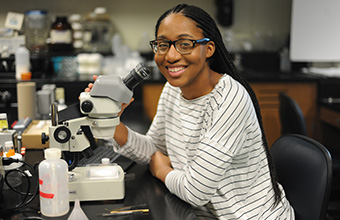College of Arts and Sciences Newsroom

Student Research
Often, students say they picked a college for its beautiful campus or extracurricular activities. Jenea Adams is a bit different: she chose the University of Dayton for the Stander Symposium, a once-a-year opportunity to present undergraduate research to the campus community.
“When I was initially visiting campus, the Stander Symposium was a program that was mentioned to me and it immediately made UD stand out compared to other institutions,” Adams said. “UD was the only college on my list that seemed to provide students with a platform to express their passions to a welcoming community.”
Adams, a junior biology major from Cleveland, is an environmental biology research assistant and undergraduate project leader in the lab of Ryan McEwan, associate professor of ecology and director of the environmental biology program. She is presenting at Stander for the first time this year; her project explores how the invasive shrub Amur honeysuckle impacts aquatic macroinvertebrates — tiny, water-dwelling organisms — in the Dayton area.
The project began four years ago with lab members exploring different parks and reserves in Dayton, locating streams and qualitatively rating the amount of Amur honeysuckle into three categories: reference, moderate and heavy. The team then went back to the streams to collect the aquatic macroinvertebrates and brought them back to the lab for analysis.
Adams’ current contributions to the ongoing project include conducting data analysis by using computer tools to sort through data, finding trends and drawing conclusions. She previously assisted other lab members in preparing the macroinvertebrates for analysis.
“Seeing students interested in Stander before they even attend the University says a lot, it shows they’re looking forward to their future career,” said McEwan said. “The idea that we have this campuswide day of alternative learning is an awesome aspect to use for recruiting. This program is important to us, it’s going to be even more important through time.”
- Liz Kyle, '18, News and Communications Student Writer
